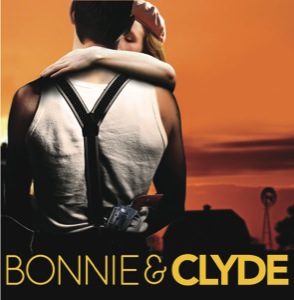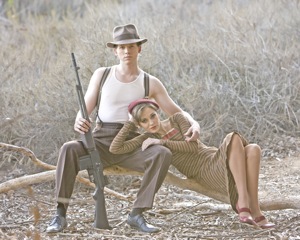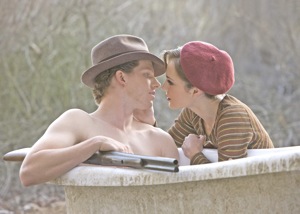feature
Stark Sands is Clyde Barrow in La Jolla Playhouse’s world premiere musical Bonnie & Clyde
Published Thursday, 19-Nov-2009 in issue 1143
Stuck in a dead-end job in Texas in the 1930s, young Bonnie Parker falls in love with Clyde Barrow, a charismatic criminal on the run from the law. Their love affair soon spirals out of control, as Bonnie & Clyde commit a series of bank robberies while staying one step ahead of the authorities. But as their notoriety — and body count — rises, the ill-fated lovers find themselves racing to the top of the Public Enemies list…with a bullet.
From the creative team of Frank Wildhorn (Jekyll & Hyde), Don Black (Sunset Boulevard) and Ivan Menchell (Chitty Chitty Bang Bang) comes this world premiere musical — with a thrilling new score that combines rockabilly, blues and gospel music.
Stark Sands, who made an impression as Charles Busch’s sexy, psychotic gay son in Die, Mommie Die, plays the role of Clyde. Sands sat down with the Gay & Lesbian Times to discuss his experience playing the real life character of Depression-era outlaw.
Gay and Lesbian Times: Bonnie & Clyde is based on the lives of Depression-era outlaws Bonnie Parker and Clyde Barrow. What challenges have you faced as you’ve prepared for your role in this production?
Stark Sands: For me the challenge is that these people were serial bank robbers and killers. For a little while during their two year crime spree they did have to be enamored to the public because it was during a time much like today when economic times were bad and they were in a big depression and everyone was kind of angry at the system and banks and these guys were specifically targeting banks and there were even times when Clyde would begin to take money from people in the room and then stop and give all the people their money back. There was a bit of a Robin Hood aspect to it but the challenge in the end they’re killers. We have to win the audience over and make the audience care about these people enough so that when it all ends, you know how it ends; I guess that’s the challenge to make these characters lovable and protagonists. It’s an interesting thing. It’s a fascinating story. You get to know them pre-crime spree. And before they really took the turn into the dark side. Hopefully that’s when we win the audience over. By the end things get dark and twisted. Hopefully at the end the audience is questioning themselves about whether or not, how they feel having cared for these people who in the end were sort of tragic.
I’ve been very lucky in my career to work as much as I have. Most of the time I play the young innocent earnest boy next door good guy. That’s sort of the energy that I emit. It’s not a stretch for me to play the nice guy.
GLT: You made an indelible impression as Charles Busch’s sexy, psychotic gay son in Die, Mommie Die! What was it like for you to change gears and not play the nice guy, but also play a gay man?
SS: You know what’s funny, all through my training and growing up in high school and college I played that brooding man type. Die, Mommie, Die! was my first film. I was so lucky. After that when people say in that film I played a psychotic drug addict obsessive compulsive twisted gay son, they follow it with it’s a wonderful role. I love that film and I’m happy that’s how I got my foot in the door. I love the movie, everyone that I know that got a chance to see it, loves it. When I would audition for something from that point on that was a little edgier, casting directors would say, ‘We love Stark, but we don’t wanna see him for this because he’s not edgy enough.’ I could now send them a clip from Die, Mommie, Die! and say ‘Ok watch this.’ It’s proof that I can do it. It’s wonderful to knock that out right out of the gate. Here I am again. Who knows maybe every six or seven years I’ll do a twisted psychotic role.
GLT: Considering current economic conditions, do you think your current role is something the audience can relate to?
SS: I hope so. I think that’s the reason we’ve done such fast track since the beginning. This is my first musical. I don’t have a litmus test. From what our composer and director and lyricist and book writer all of them who have experience doing this, they all say this one is happening way faster than any other job they’ve put together.
I think it’s because of what you said. It’s because there’s this topicality to this subject. Thankfully there’s not somebody out there doing this today. I think these two people got positive notoriety at the beginning because it was fantasy to a lot of people. People lost everything. They lost their homes, their farms and are angry at the banks and maybe wish they could go and get their money back. And they saw these two people I think specifically because they were a couple and they were clearly in love and Bonnie’s poetry got leaked out and they would take photos of each other and then they would leave them behind. The press would grab the photos and print them all over the newspapers and that’s what really did it. They were sort of tabloid heroes.
GLT: There is an entire love story behind these two characters, yet they are ultimately mass murderers. How is that portrayed in the production?
SS: I’ve heard a lot about this since we started workshop readings this year in New York. I’ve been reading books ever since January. What I’ve learned and luckily what this script is based on is the truth, which is Clyde grew up in a bad time in a bad part of town and was arrested very young for stealing turkeys when he was 12. He was stealing turkeys for Thanksgiving so his family could have a nice Thanksgiving meal.
GLT: So he truly was like a Robin Hood of his times?
SS: Yeah but he got caught. And after that he had a record and it was really tough, because in a time where it’s hard enough to get a job, the police kept an eye on him. Every time he would get a ‘straight job’ working in a factory or on a production line of something, he would not get the job because they’d find out he had a record. Or he’d get the job and two weeks later the cops would come by and notice him and tell the proprietor, ‘Oh by the way, you have an ex-con right there.’ Then he’d get fired. He wasn’t left with a lot of options. It’s not suggesting that’s the answer, but in a time when it was hard to get a job at all, for him it was impossible to keep one. In this production, you get to see that these two people fell in love before things got bad. His goal was never to kill people. It was always to provide a better life for himself and her. He only killed when he was provoked. Except towards the end, there were a few cases when based on some mistakes one of the Kid Gang members would pull the trigger, he sort of had to follow suit because at that point you can’t really walk away from it. I know that he never meant to kill people, but in the end, it just happens whenever you’re toting around automatic weapons, robbing banks and people are shooting at you. You’re shooting back, you’re in danger of taking someone’s life.
GLT: What are your thoughts on that in today’s times with kids growing up with gangs?
SS: It’s opened up my eyes to a lot of things. I was very lucky growing up. I didn’t have any reason to think about this stuff. It’s been eye opening to know I think that the majority of people aren’t born with advantages and are faced with much stiffer odds. If they get caught up in something early on, it only makes it that much harder to keep a straight life without once you’ve already got something on your record, it’s there. It’s not easy to get rid of it and it’s going to affect the rest of your life. So these are new thoughts for me.
That’s one of the wonderful things about this job, I get to step into someone else’s shoes for a period of time but I get to learn about their life and lives like that and sometimes I get to learn new skills it’s fun its like a continuing education all the time.
GLT: Is this the first biographical role you’ve played?
SS: No a year ago I was in an HBO series called “Generation Kill” and it was about the Marines of the first recon battalion that invaded Iraq in 2003, during Operation Iraqi Freedom No. 1. It was a true story, and all of the actors in it were portraying real Marines. In that one I portrayed a Marine captain named Nathaniel Fick. He survived the war and it was crazy cool, because I was able to get him on the phone to verify facts. I got to pick up the phone and say, ‘Hey its Stark. So listen, remember that day when you guys were about to cross that bridge into and you got under that heavy gun fire, what was going through your head?’ It was unparalleled access. Really great. And he’s a great guy we keep in touch. We’ve met on a few occasions and that was the other time I played a real person.
GLT: With so much history here, do you feel like you have the same access?
I feel like I have a lot of access to this because there are so many books about Bonnie and Clyde and they can reference the film from 1967. I’m not sure with what I know now with the different books I’ve read. I’m not sure any of them are entirely factual. I know everyone’s got their own take on it. The movie was a very Hollywood version of these two people because it is. That’s what it is it’s a movie. It’s two hours worth of entertainment I know the movie was groundbreaking and I love it. But it’s not the true story we’re telling. We’re telling the story in between the bank robberies and the car chases. It’s really about these two people and their relationship.
GLT: You’ve played both on screen and on stage. Which do you prefer?
SS: It really depends on the job, but I’ll say ever since I stepped back into theater two, almost three years ago, I love the process. I love it because you spend a lot of time with your fellow actors and everyone involved. You build real relationships. It’s not always that way when you’re working in film because you might not be called for a few days. You go to set you work and it’s not the same schedule. What we’re doing now, this week we’re working from noon to midnight every day because we have to put all the technical elements of the show into it like costumes and microphones and the set and the props and its great but it’s a long day. But it’s a long day with my cast. We’re all together it’s a good group. And then we get to do the show over and over, I know that sounds like torture to some people but I love the way my brain activates doing this kind of work when you’re forced to be on point all the time. It’s really softened me up and I did a play called journey’s end on Broadway a few years ago. And it was a wonderful experience and I feel like I got fine tuned in that experience. We did 150 performances and the show won Tonys and was very well received. Immediately after that I went off and did this HBO series and I know from my own experience doing it that the one job made me better at the other job. I felt like I got what I needed in less takes in that series because I was so practiced at performing on a regular basis. I don’t wanna give up one for the other but I really love doing this theater stuff.
I’m starting to miss working in film and television. I’m hoping I can find something to do in the next in that vein. I’m gonna be heading back to L.A. after this and knock on wood that I’ll keep working.
GLT: You truly have a passion for your work. Why did you get into acting?
SS: When I was in high school I tried to get into after middle school between eighth and ninth grade I switched schools and I was going to a new school and my mom basically asked, her sister worked at the school, my aunt and she asked what would be a good way for him to make friends since he’s new and my aunt suggested this theatre arts class, specifically a talented and gifted theatre arts class where you’d have to audition to get in but the reason was it had kids from freshman sophomore junior and senior classes in it. That way you get exposed to different ages, it’s a friendly room you don’t have to sit behind a desk and keep quiet it’s a friendly room. It was a really great idea. I auditioned for the class; I didn’t know what to do. I brought in the back of a cereal box and that was my monologue and the teacher looked at me and she thought, she heard something I guess it was decency. She gave me one of Tybalt’s monologues from Romeo and Juliet, I took it outside and worked on it in the hallway, I came back in and I read it and she was like ok you’re in. That’s how I got into theatre. Later, she saw something in me somehow over that cereal box but I was really nurtured off the bat. I wasn’t immediately good at it but I had a knack for it. I found something that I was inherently good at, I had a knack for it and it was nurtured and that became my thing and music was the other thing. I was a singer and I was in choir I had a band in high school so I finally now get to put these two things together in a professional sense.
GLT: What’s next for you?
SS: That’s a good question. I have really good confidence that Bonnie and Clyde will have a life beyond its goal. If it does that would be sometime in the near future. Hopefully in another big city. For the time being I’m so focused on this. I’m just excited to get through it and I love every minute of it. It’s an exciting thing to have a wonderful job like this. Sometimes I hate it; sometimes I love the uncertainty of being an actor in this business. Sometimes you know what you’re doing for a long time and sometimes the doors are wide open and the options are out there.
GLT: You’re working with a playhouse that has a history moving eastward. Hopefully you’ll be performing this role in that ‘big city.’
SS: That’s very true and certainly the goal.
Bonnie & Clyde
When: Opens Nov. 22, runs through Dec. 20
Where: Mandell Weiss Theatre, La Jolla Playhouse
Tickets: $43-$78
Box Office: 858-550-1010
|
|
Copyright © 2003-2025 Uptown Publications




